Dear Family
The events of this month have reminded me of a story told by Aunt Rebecca (I think it was Aunt Rebecca) at a family reunion many years ago about how her father (my Grandpa Willis) attempted to explain to his six daughters (and perhaps to a lesser degree his two sons) that, if you know what you’re doing, you really ought to be able to make do with just two squares of toilet paper.
The fact that Crystal’s most recent Safeway run found it cleaned out not only of toilet paper but also of napkins, facial tissue, and paper towels is further evidence that Grandpa, who came of age during the Great Depression and died in 1997, may have been a man ahead of his time. (The run on every conceivable type of paper product also raises the troubling likelihood there’s quite a bit of stuff getting flushed that shouldn’t be.)

The story about Grandpa and toilet paper may well be apocryphal (I’ll find out within a few hours of posting this) but it’s completely believable. This is, after all, the man whom I recall hearing lecture his posterity (at another family reunion) on the nuanced differences between tax evasion, which he did not recommend (because it’s illegal), and tax avoidance, which he characterized as part of a prudent, long-term investment strategy.
Grandpa was one of what I can only imagine is a relatively small number of people to have played both the Reims Cathedral organ (in France) and the Tabernacle organ (in Salt Lake City). To the extent that Sophie’s and my competence as organists can be attributed to our DNA, those genes seem likely to trace back primarily through him.
Meanwhile, I’m starting to wonder whether Sophie has played her last sacrament meeting as our ward organist. Because the pandemic has not yet afflicted the five people living here in any significant way—no one’s sick, I’m still getting paid to work from home, and (perhaps most important) we still have reliable broadband internet and many years of quality content to stream—my mind is free to fret over the possibility that all this could change tomorrow. Not having any idea what life will look like a month from now—two months from now, six months from now—is profoundly unsettling.
(Also unsettling is the fact that our Wi-Fi reliably reaches every corner of the house except my side of the bed. Crystal is getting better at suppressing her frustration whenever she enters the room to find my laptop and me set up on her side, but I don’t know how much longer we can live like this.)
The uncertainty of our future hit me hardest earlier this week when Sophie reserved her spot in BYU’s Heritage Halls for the upcoming school year. Heritage is the enclave of on-campus dorms with kitchens where residents do their own cooking – total rent for the 8-month academic year (which I include for the sole purpose of making my local friends who read this jealous): $3,875. I sincerely hope that five months hence we’ve reached a point on “the curve” where she can move in. But it is becoming less and less difficult to envision a scenario in which we haven’t.
But whatever happens, BYU mailed her some socks this week, so she’s got that going for her.
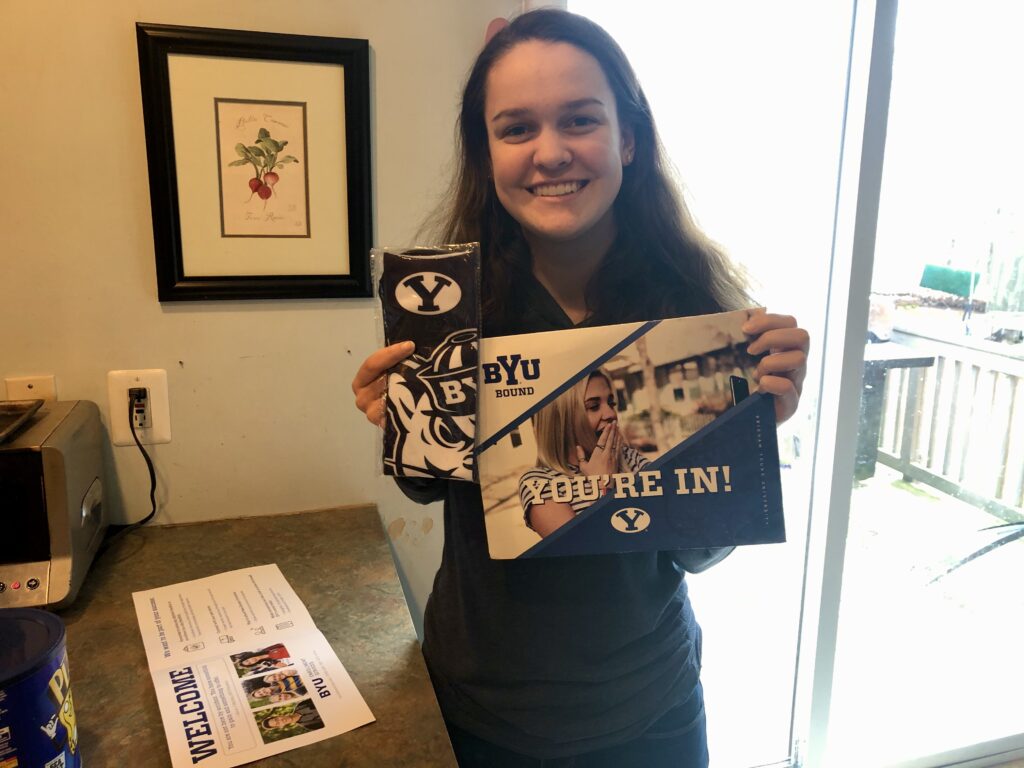
So Sophie’s in. Hannah, meanwhile, is out. BYU cancelled graduation, which would have been on April 23rd. My guess, unless something unimaginable and miraculous transpires, is that Crystal and I will cancel our trip out there next month, but we haven’t done it yet.
Hannah continues to log long hours (70 last week) at the nursing home. Amazingly, she appears to genuinely enjoy this. She reports that no one there has been diagnosed with COVID-19 (yet).
(I now have this irrepressible need to qualify all my negative statements with the word yet. My unsettling feelings of uncertainty seem to be amplified by companion sentiments of foreboding and inevitability. I’m clearly not the only one who feels this way. A work colleague told me the other day that she was “on an every-other-day anxiety schedule.” When I asked what day she was on, she replied, “I’m honestly not sure.”)
Anyway, Hannah’s nursing home is perpetually short-staffed because no one can come to work for 14 days if they develop so much as a mild cough. One of Hannah’s jobs is to take the temperature of everyone entering the facility and have them sign a statement asserting that they have no symptoms.
As of this instant, Sophie’s high school graduation has not yet been officially cancelled. It of course will be. As will prom and any number of spring rites of passage for American high school seniors. I asked her the other day whether having high school end this way saddened her. “Not particularly,” she replied. “I was getting pretty tired of it.”
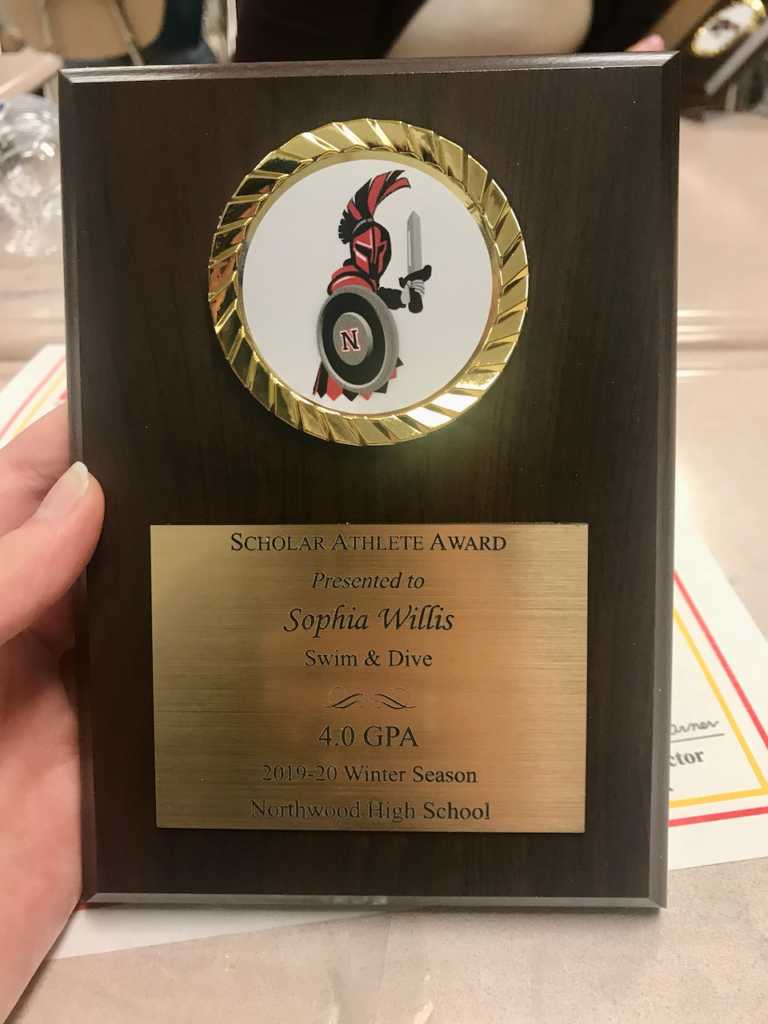
For those of us who are not (yet) suffering, life sometimes feels like it’s becoming an exercise in waiting for the next thing to be cancelled. You’ll be sad and unsurprised to learn that the Kinetic (half-iron) triathlon on May 9th, which I’ve done a half-dozen times, has been cancelled. The next race on my calendar is the Baltimore 10 Miler on the first Saturday in June. That has not yet been canceled, but it will be. The YMCA has been closed since Monday, March 16th, leaving me (and the rest of the world) with no place to swim. As depressing as this is for me, I can only imagine what it’s like for real swimmers.
And so I fill the extra time with more running and cycling. I’m on no particular training schedule, because I don’t even know what I’m training for anymore, but logging the miles brings me a modicum of solace. It’s also been quite some time since anyone honked at me on me on my bike because there are so few cars on the roads.
I biked down to the cherry blossoms early (i.e., before dawn) two Fridays ago thinking I would have the place to myself and was surprised by the number of people we encountered. It was not difficult to stay away from people in such an open area, but we wouldn’t have gone if we’d known that everyone else was going to have the same idea. Sorry—we’ll never do it again.
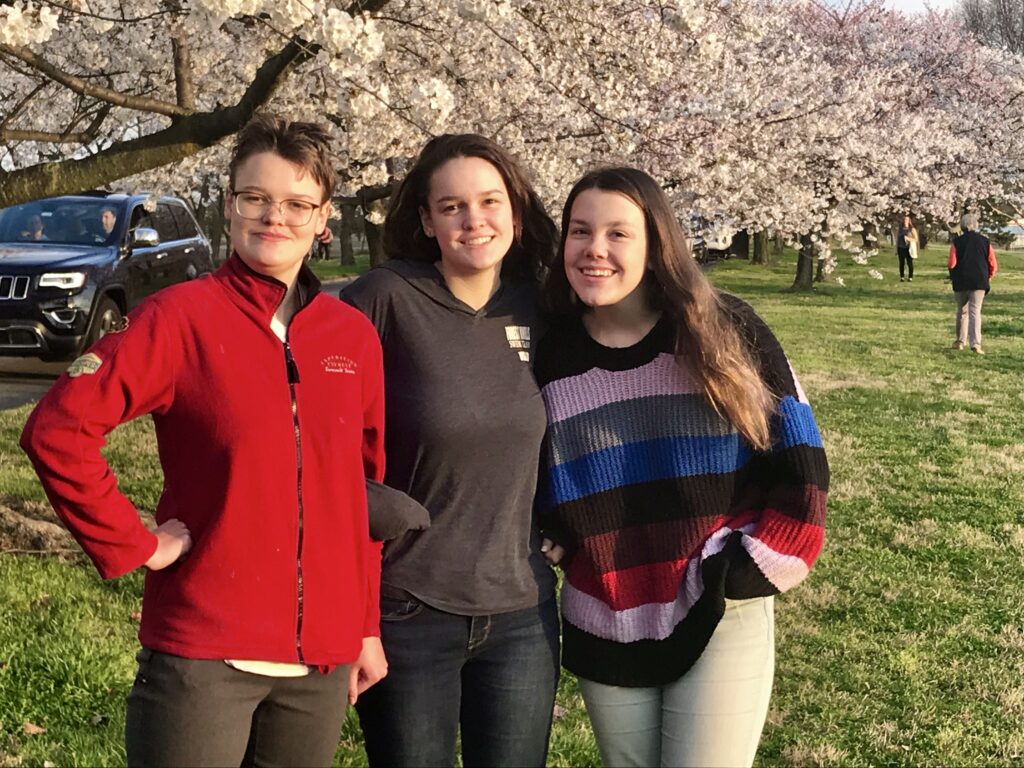
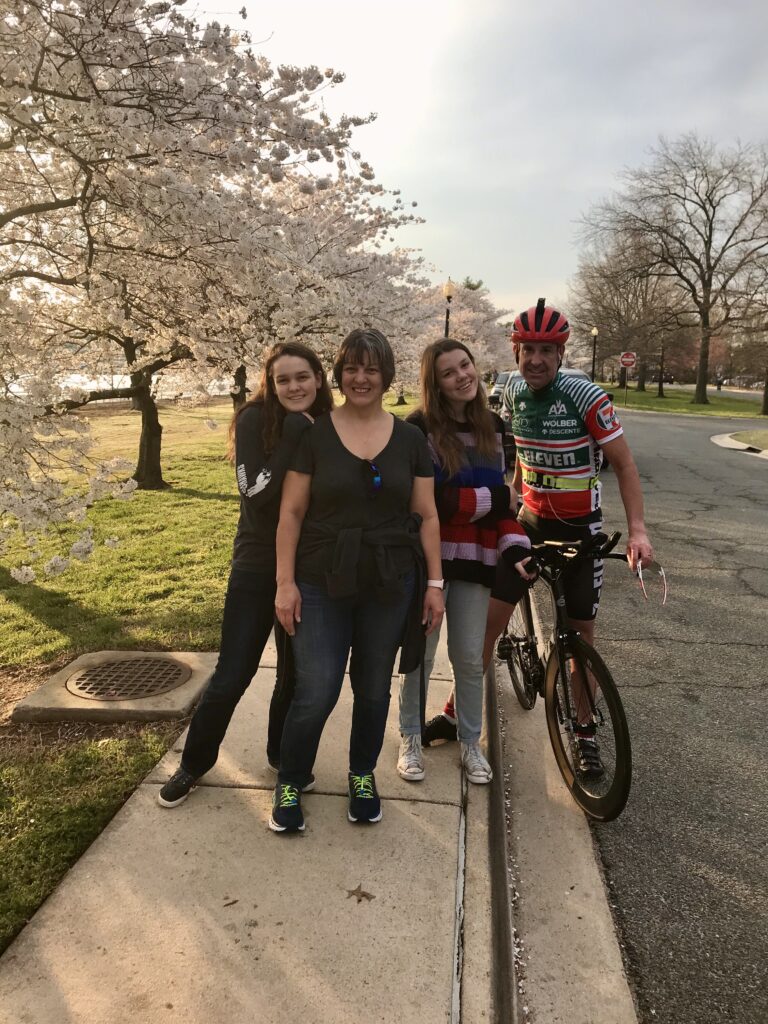
I feel like I’m encountering more fellow runners now than before the pandemic. People have various ways of respecting (or ignoring) the six-foot buffer zone on the Sligo Creek Trail (where I do most of my running). The paved trail is a solid 8 feet wide, which would theoretically allow ample space for safely passing. But the other day a woman running in the opposite direction saw me approaching and veered so far off the trail to avoid me that I thought she might fall into the creek.
It felt like I was back in high school.
Speaking of which, my 30th reunion, which would have taken place this Memorial Day weekend, has also been cancelled (or “postponed” or whatever euphemism we’re using today). It’s unlikely that I would have gone anyway. I haven’t been to any past reunions, and I think I’m connected to a grand total of three former classmates on Facebook. Earlier this month I sent a friend request to my best friend from 6th thru 9th grade. If he were going to the reunion, I might have considered it, but he ignored my request.
I sometimes joke that Moorestown High School, reflecting the 338-year-old South Jersey Quaker town in which I grew up, is “102 percent white.” (Our mascot is the “Quakers,” which might raise alarms about cultural appropriation in the 21st Century, but I don’t recall any major street protests over it in the 20th.)
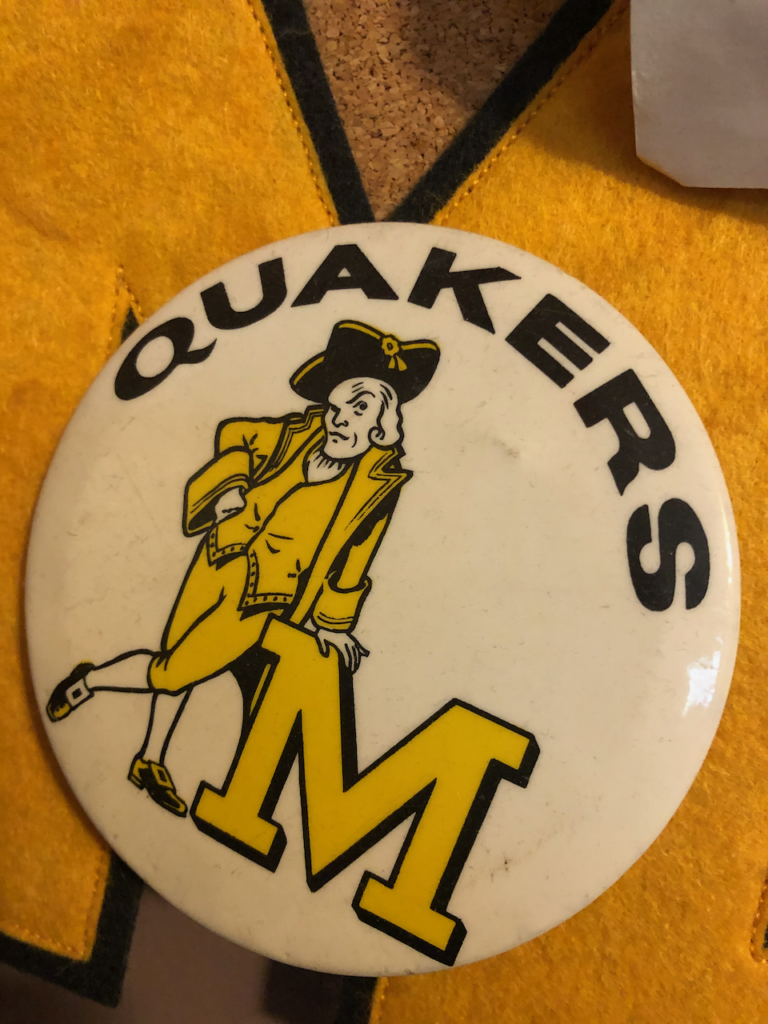
The “102 percent” statistic is a mild exaggeration. (Moorestown, according to Wikipedia, was only 90 percent white as of the 2000 Census, though I expect that figure was higher in 1990.) But it got me to thinking about how different my adolescent circle was from my daughters’. Earlier this month, before “things fell apart” (to quote my missionary niece, Abby), it came up in some conversation somewhere that (for now, anyway) a majority of people in the United States consider themselves white.
Grace could not (and still can’t) bring herself to believe this is actually true. A glance at the demographics of the schools she has attended provides some insight as to why. According to the school district’s website, our neighborhood elementary school (which all four girls attended) is 34 percent white; Grace’s middle school (which everyone except Lucy attended) is 27 percent white; and Grace’s high school (which everyone except Hannah attended) is 14 percent white.
With the occasional exception of middle school, which tends to be awful for everybody everywhere (my theory is that if you have mostly positive memories of middle school, then you were probably part of the problem), the girls have had mostly good educational experiences and great friends at all of these schools. This place isn’t perfect—it’s not half as tolerant as it thinks it is—but it’s been terrific for us.
It feels like an awfully long time ago, but the first third of the month was actually fairly eventful.
It began with a celebration of Grace’s 15th birthday. In what we did not realize would turn out to be a theme for the rest of the month, we marked the occasion by ordering in from Red Maple (an Asian restaurant in the neighborhood) and watching an old episode of Monk on Amazon.
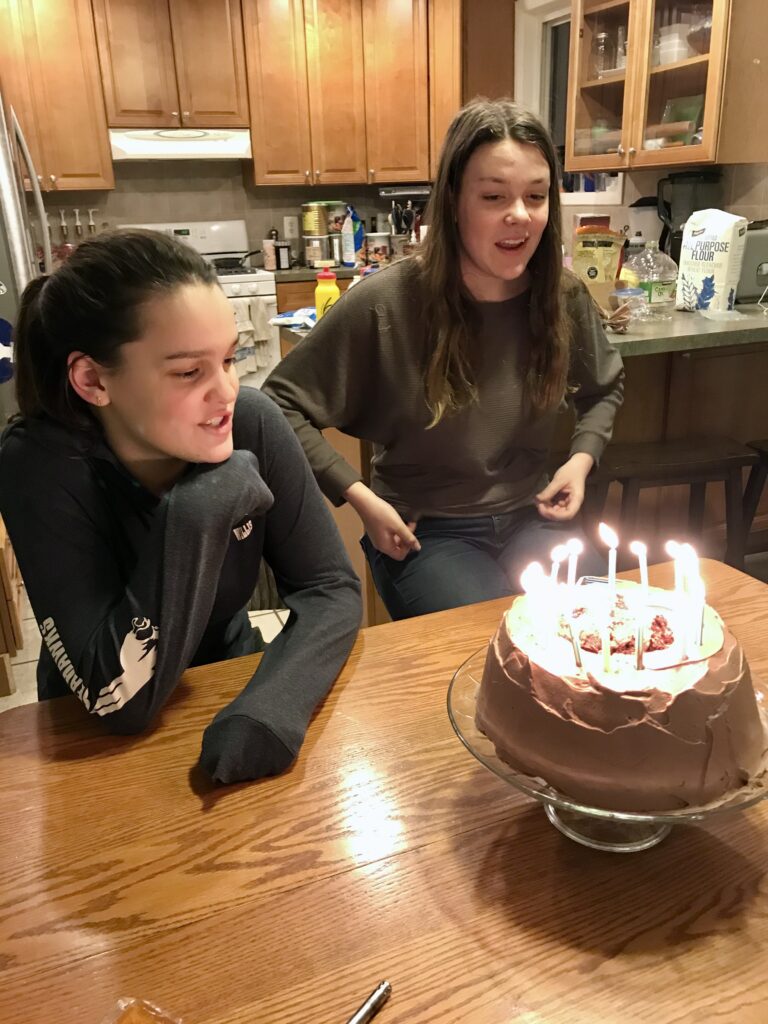
Something resembling this has become a nearly nightly tradition. Grace’s birthday was only different in that it included cake and Sophie’s ceremonial reading of the March 2005 Famlet, which recounts the events surrounding Grace’s birth. Sometimes I wonder why I write this stupid thing every month. Little things like this I guess are one reason.
The first 10 days of the month also included Lucy’s portrayal of Cinderella alongside other Montgomery College students at a “character brunch” for children at Walter Reed National Military Medical Center in Bethesda. She sang something—I can’t remember what—and I didn’t hear it (or get any pictures) because they don’t let people like me into Walter Reed. But I’m sure it was lovely.
Sophie, who has recently taken a liking to basketball, joined our ward Young Women’s team. I don’t think they won any games, but the stake president praised her tenacious defense and the fact that she had “almost made two fouls shots” (a diplomatic and churchy way of saying that she had missed both shots). Sophie, being Sophie, continued working at it and actually scored 4 (of the team’s 11) points in one of her last games. She was clearly trending upward and almost certainly on the verge of multiple scholarship and contract offers.
But then the world stopped.
I’ve been working exclusively from home since March 11th, and schools have been closed since March 13th. Lucy’s and Sophie’s Montgomery College classes restarted (remotely) on Monday, the 23rd, and the first phase of the Montgomery County Public Schools “online learning plan” begins tomorrow. This mind-blowing (to me) undertaking has required distributing some extraordinary number of laptops and internet hotspots in order to ensure that all of the county’s 163,000 public school students have access to the various online learning platforms and activities. I still can’t get my head around it, but I’m genuinely impressed by the scale of the effort.
Meanwhile, I guess we’re just taking things one day at a time like everybody else. Our toilet paper supply is okay for now. One of Sophie’s friends/classmates works at the nearby Woodmoor Bakery and sometimes brings us surplus croissants, donuts, and bread, so that we’ve got that going for us. And so long as Trader Joe’s can manage to keep milk and Frosted Maple and Brown Sugar Shredded Bite-Size Wheats in stock, I think there’s a chance we can make it through this.
In truth, we are mildly inconvenienced but not suffering at all (yet). Our hearts go out to the many who are. Crystal chokes up a little when she prays out loud for the people working in the grocery stores. We are grateful for them, for the smart and wise people who are trying to work out what “The Next Right Thing” is (sorry, we just watched Frozen II), and for you.
Love, Tim
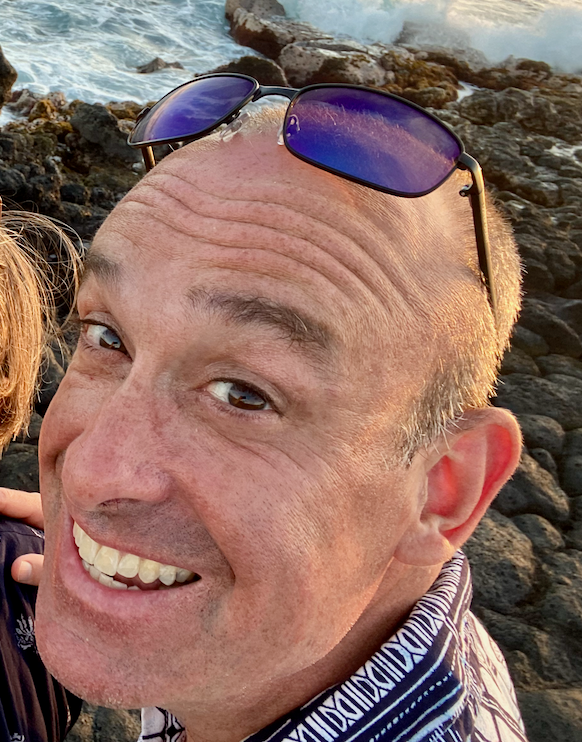
Managing Editor of The Famlet Monthly
